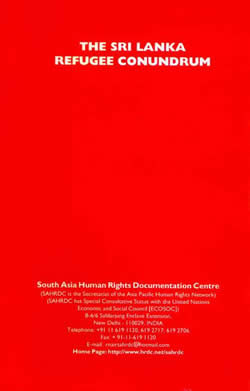Ilankai Tamil Sangam30th Year on the Web Association of Tamils of Sri Lanka in the USA |
|||
 Home Home Archives Archives |
Sri Lankan War-Refugees in India Face Struggle to Return Homeby Nita Bhalla, AlertNet (Reuters), March 16, 2010
Many Sri Lankans who fled to India during their country's protracted civil war want to go home now the conflict is over, but hurdles lie ahead as preparations begin for their return, aid workers said on Tuesday. Over 100,000 Sri Lankans are estimated to have sought refuge in southern India during the conflict between separatist rebels and the Sri Lankan army, which lasted a quarter of a century. The civil war ended in May last year with government forces defeating the Liberation Tigers of Tamil Eelam (LTTE), but the fighting has left much of the north of the Indian Ocean island in ruins, heavily mined and hundreds of thousands of civilians are internally displaced. Tens of thousands of refugees, who belong to the minority Tamil ethnicity, have lived in camps across India's Tamil Nadu state for more than two decades and have assimilated into local communities. But many yearn to return and rebuild their lives in their homeland, aid workers say. "The ultimate reason for being a refugee has diminished," said Christian Aid's Gordon Shannon. "Now, more than any other time during the 25-year-old war, is the most positive time...to start preparations for the refugees to go back." "Both the Indian and Sri Lankan governments are positive about their return, but there is a lot of preparatory work which needs to be done and it could take another one to two years before we see mass organised repatriations," he added.
According to Christian Aid, which has been supporting refugees living in 115 camps across Tamil Nadu for over 20 years, most fled the violence fearing for their lives with many losing loved ones during the fighting. After travelling in fishing boats from northern parts of Sri Lanka such as Jaffna across the Palk Straits to Tamil Nadu, the refugees were accepted by the Indian authorities. India has been providing them with shelter, food, health and education services as well as financial allowances. Over the years, children have been born in the camps, refugees have married one another and many have gained education qualifications and vocational skills in India. Yet most do not have birth or marriage certificates while others do not have entitlement papers for the land they owned in Sri Lanka. There are also around 30,000 refugees who are "stateless" with no citizenship documentation. "The issue of documentation is very important and without this paperwork, they will be unlikely to return," Satchithananda Valan, project director for the Adventist Development and Relief Agency (ADRA), told AlertNet by phone from Chennai, Tamil Nadu's capital. Valan, whose organisation has been supporting water and sanitation projects in the camps, said both countries were working with the refugees on how to overcome these bureaucratic hurdles. RESETTLING THE DISPLACED Aid workers emphasise that the return of refugees will be dependent on the situation on the ground and how effectively Sri Lankan authorities resettle nearly 300,000 internally displaced people in areas which had been under LTTE control for decades. The government has so far resettled more than half of those who were uprooted from their homes during the war, but tens of thousands still remain in displacement camps. Aid workers say many areas still remain heavily mined and scattered with unexploded ordnances. Those returning are also finding their homes, schools and health facilities in ruins with little power, telecommunications or clean water supply. Most families also need support to help them rebuild their livelihoods - farming communities need functioning irrigation systems, livestock, seeds, fertilizers and tools while fishing communities will need boats and equipment which were destroyed during the conflict. Markets and banking structures also need to be improved or re-established after decades of neglect. But most importantly, there has to be a sense of security for those returning, aid workers say. "The refugees are closely watching what is happening with those internally displaced people and if they feel secure and have been rehabilitated well with freedom of movement and their rights protected, many will return," said Christian Aid's Shannon. |
||
|
|||
 NO RECOGNITION
NO RECOGNITION